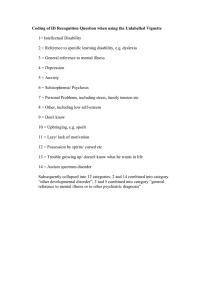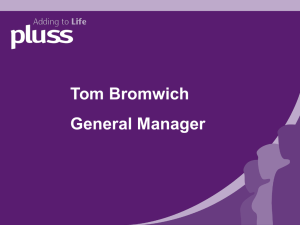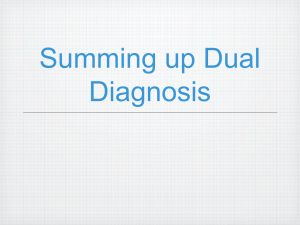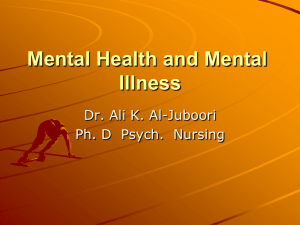Overcoming the Negative Impact of a Psychiatric Disability
advertisement
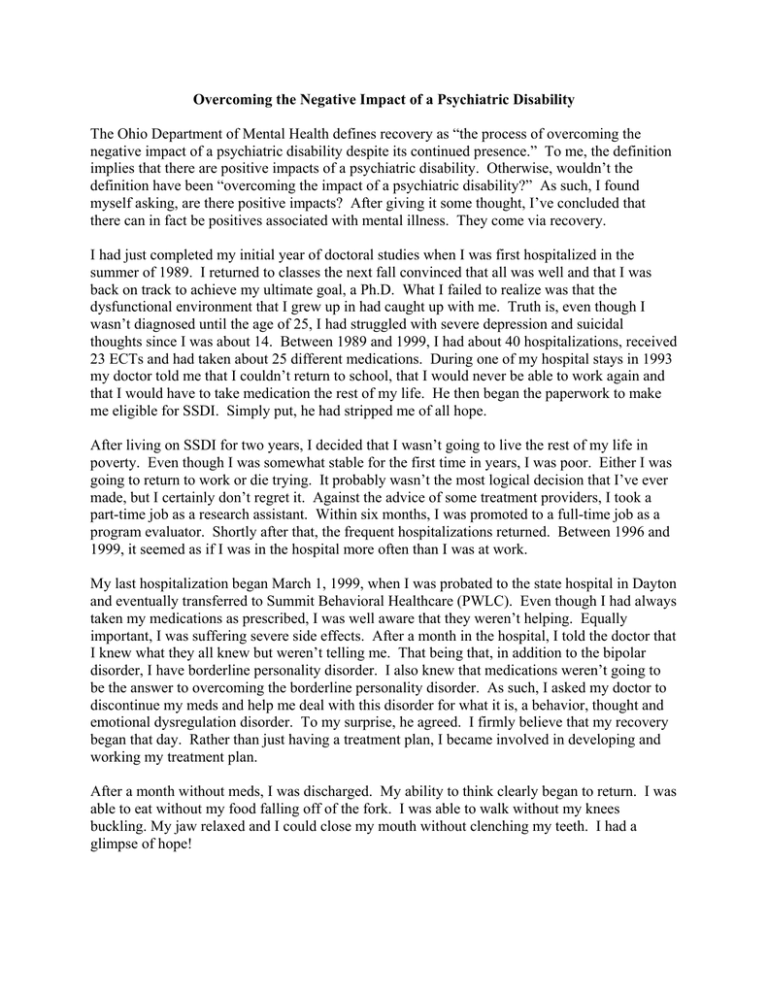
Overcoming the Negative Impact of a Psychiatric Disability The Ohio Department of Mental Health defines recovery as “the process of overcoming the negative impact of a psychiatric disability despite its continued presence.” To me, the definition implies that there are positive impacts of a psychiatric disability. Otherwise, wouldn’t the definition have been “overcoming the impact of a psychiatric disability?” As such, I found myself asking, are there positive impacts? After giving it some thought, I’ve concluded that there can in fact be positives associated with mental illness. They come via recovery. I had just completed my initial year of doctoral studies when I was first hospitalized in the summer of 1989. I returned to classes the next fall convinced that all was well and that I was back on track to achieve my ultimate goal, a Ph.D. What I failed to realize was that the dysfunctional environment that I grew up in had caught up with me. Truth is, even though I wasn’t diagnosed until the age of 25, I had struggled with severe depression and suicidal thoughts since I was about 14. Between 1989 and 1999, I had about 40 hospitalizations, received 23 ECTs and had taken about 25 different medications. During one of my hospital stays in 1993 my doctor told me that I couldn’t return to school, that I would never be able to work again and that I would have to take medication the rest of my life. He then began the paperwork to make me eligible for SSDI. Simply put, he had stripped me of all hope. After living on SSDI for two years, I decided that I wasn’t going to live the rest of my life in poverty. Even though I was somewhat stable for the first time in years, I was poor. Either I was going to return to work or die trying. It probably wasn’t the most logical decision that I’ve ever made, but I certainly don’t regret it. Against the advice of some treatment providers, I took a part-time job as a research assistant. Within six months, I was promoted to a full-time job as a program evaluator. Shortly after that, the frequent hospitalizations returned. Between 1996 and 1999, it seemed as if I was in the hospital more often than I was at work. My last hospitalization began March 1, 1999, when I was probated to the state hospital in Dayton and eventually transferred to Summit Behavioral Healthcare (PWLC). Even though I had always taken my medications as prescribed, I was well aware that they weren’t helping. Equally important, I was suffering severe side effects. After a month in the hospital, I told the doctor that I knew what they all knew but weren’t telling me. That being that, in addition to the bipolar disorder, I have borderline personality disorder. I also knew that medications weren’t going to be the answer to overcoming the borderline personality disorder. As such, I asked my doctor to discontinue my meds and help me deal with this disorder for what it is, a behavior, thought and emotional dysregulation disorder. To my surprise, he agreed. I firmly believe that my recovery began that day. Rather than just having a treatment plan, I became involved in developing and working my treatment plan. After a month without meds, I was discharged. My ability to think clearly began to return. I was able to eat without my food falling off of the fork. I was able to walk without my knees buckling. My jaw relaxed and I could close my mouth without clenching my teeth. I had a glimpse of hope! Nine months later, I applied for and obtained the position of “recovery coordinator” at the mental health board. The position was created as part of a three-year grant that was received from the Ohio Department of Mental Health. This was the ticket to my continued progress in my recovery. After all, a recovery coordinator has to exemplify recovery, right? Through the grant I was able to develop a very personal understanding of what recovery is, which in turn, resulted in significant progress in my recovery. Recovery is the process of going from having mental illness impact 80% or more of my life to having it impact maybe 10% of my life. For me, recovery is no longer having a psychiatric disability, but rather reaching the point where the disability becomes merely a condition. While I’ve not been in the hospital since 1999, recovery allowed me to shift from the mentality of avoiding the hospital, to not needing the hospital yet recognizing the value of it should the need arise. Recovery is being a person who happens to have a mental illness rather than a mentally ill person. Ultimately, recovery is overcoming the negative impact of a psychiatric disability and discovering the positive impacts. Recovery has allowed me to become a better and healthier person than I was before being diagnosed with a mental illness. I hadn’t had a positive self-esteem since I was about 12 years old. Today, I am confident about who I am and how I feel about myself. No longer do I look at my shoes when I talk to people. Prior to my mental illness, I relied on everyone for everything. Today, I am a fairly independent woman. I now understand that my feelings, all of them, are okay. Even anger! I understand that drinking, when not avoiding life, is okay. Prior to my recovery, I displayed signs of narcissism. Actually, I still do at times! But, I now realize that the world doesn’t revolve around me; and when the world doesn’t revolve around me, I have the ability to be compassionate and giving towards others. I have a glimpse of what friendship and social interaction is about, and let me tell you, it’s far more rewarding than the “emotional safety” I sought via isolation. After having been evicted from an apartment and asked to leave a church due to my mental illness, I have a hint of what it feels like to be discriminated against. As a result, I think I am more accepting of those who are somehow different than me. The discharge summary from my last hospitalization stated that my prognosis is “poor,” and recommended that I not live alone in the community. A little over a year ago, I purchased my first home. It’s great to be a home owner, but it’s particularly special to feel physically and emotionally safe in my home. Mental illness is devastating. But, through recovery from the illness, I have a career, social and community life in front of me that only I can limit. --Reneé Kopache
